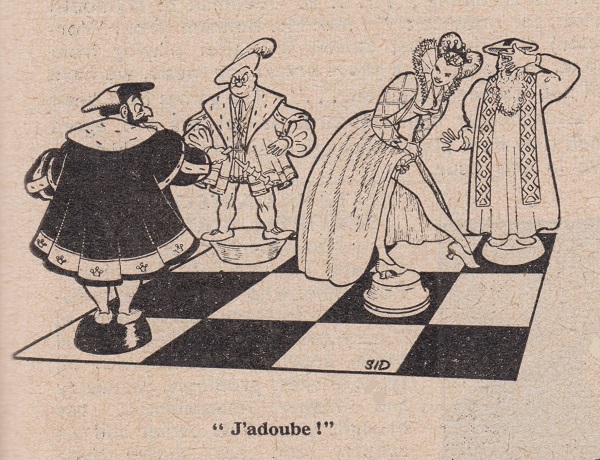
Edward Winter

CHESS, January 1950, page 69
If ‘j’adoube’ means ‘I adjust’, why is the verb adouber absent from most French dictionaries? The answer is simply that the word is now obsolete in all but the chess context. In the middle ages un adoubement was the ceremony at which a young noble was made a knight, received his arms, etc. By the eighteenth century adouber had been extended to mean ‘to equip, to arrange’ and, subsequently, to ‘adjust’ in chess. The next question is: how many people still say ‘j’adoube’? Is there a decline in the amount that nous adoubons?
(36)
Land and Water for 28 June 1873 quotes some excellent advice that appeared in the Liverpool Weekly Albion:
‘If you see you have made a bad move retract it as soon as possible, of course saying, “J’adoube”, otherwise it might appear illegal to do so, and you must, of course, insist on the strict game – at least when it applies to your adversary. It is not well to allow more than another move to take place before availing yourself of this resource of genius, and therefore it is always well to keep your fingers hovering over the board in a loose kind of way as much as you can until you are satisfied you cannot improve on your play. By no means say “J’adoube” quickly, as if it were an afterthought, but calmly and deliberately, so that discussion may be checked in the outset. Another advantage in saying “J’adoube” may be found in the privilege of pushing about your own and your opponent’s men when he is in profound calculation. It is a cheerful diversion for you, and the expression makes it quite legal for you to do it. If you do not wish your opponent to suspect your line of play, consider first and decide quietly what it is to be, then solemnly place your finger on a perfectly remote square of the board. Frown and gaze intently for some time and mutter to yourself; then suddenly make your actual move. It comes on your adversary like a mental shower-bath or an electric shock, and takes his breath away.’
(54)
Page 313 of A Chess Omnibus included a passage on page 195 of the September 1908 American Chess Bulletin which was quoted from the Australasian:
‘No common commotion was caused among the masters who were playing at Vienna by Herr Tartakower’s attempt to deny the existence in the chess code of the “J’adoube” rule. The preposterous claim had one funny result. Professor Berger, who was paired with Herr Süchting, was so much unnerved by the disturbance that he overlooked a mate on the move. His more stolid opponent at once effected the mate. Thereupon Professor Berger lodged a protest against a loss of which, as he said, the Tartakower-Maróczy incident had been the cause. It seems possible that the equity of the claim was not denied by the playing committee; but the legal force of the claim was not acknowledged; and Herr Süchting was allowed to score the game as a win.’
From page 6 of the October 1908 Chess Amateur:
‘What is the origin and history of the expression “j’adoube” as applied to chess?
In the revised British Chess Code we find the following rule: “A player, in his own turn to play, may adjust any man, provided that, immediately before touching it for adjustment, he gives notice of his intention to adjust that man.” (It’s unfair to require a dumb player to speak.) The origin is simple. A French player, when he wished to adjust a man, said “j’adoube”, and English players followed suit. Fifty years ago it was the custom of some people to spout scraps of French. These played a “partie”, took “en passant”, and did the “j’adoube”. “Game”, “in passing” and “I adjust” were too vulgar.’
What historical evidence exists for these assertions?
More generally, we shall appreciate any hard facts from readers on ‘J’adoube’ – or ‘J’Doube’ to borrow the spelling on page 2 of How to Play Chess Like an Animal by Anthea Carson and Brian Wall (Colorado Springs, 2007).
Information is sought, not least, on equivalent expressions in other languages. For example, do many Spanish players nowadays say ‘Compongo’ (the first person singular, present tense, of componer)? The following entry appeared in the ‘Vocabulario técnico’ on page 46 of Vademecum de ajedrez by Julio Ganzo (Madrid, 1972):
‘Compongo – Palabra usada cuando se va a tocar una pieza sin jugarla, con el objeto de centrarla en su casilla.’
The Small Chess Dictionary by Y. Averbakh (Belgrade, 1980) gave, on page 35, поправляю in Russian and Popravljam in Serbo-Croat.
(5485)
From Robert John McCrary (Columbia, SC, USA):
‘The earliest mention of “J’adoube” that I have found is on page 3 of J.H. Sarratt’s A Treatise on the Game of Chess, volume I (London, 1808). He gives the 7th Law of chess as follows:
“When a player has touched a piece, he must move it, unless, at the moment of touching it, he should say ‘J’adoube’: if a piece be not placed exactly in the centre of its square, or if it should fall, the player must say ‘J’adoube’ in placing it properly; else, his adversary may compel him to play it.”
In George Walker’s A New Treatise on Chess (London, 1833), pages 16-17, the requirement to say “J’adoube” is given similarly as in Sarratt, but Walker states that it is “an obsolete expression, signifying ‘I adjust’ or ‘I replace’”.
Page 13 of William Lewis’ The Chess-Board Companion (London, 1838) has a very similar explanation.’
Paul Dorion (Montreal, Canada) notes that the French verb adouber is quite commonly seen nowadays when, for instance, a politician endorses a potential successor. Recent news headlines include ‘Bush adoube McCain’ and ‘Poutine adoube Medvedev’.
(5493)
Michael Clapham (Ipswich, England) writes:
‘The term “j’adoube” is included in Philidor’s Analysis of the Game of Chess (London, 1790). See pages 127 and 128 of Volume II in the Rules, which, according to Philidor, “the Society or Club of Chess in England have adopted for their code”.’
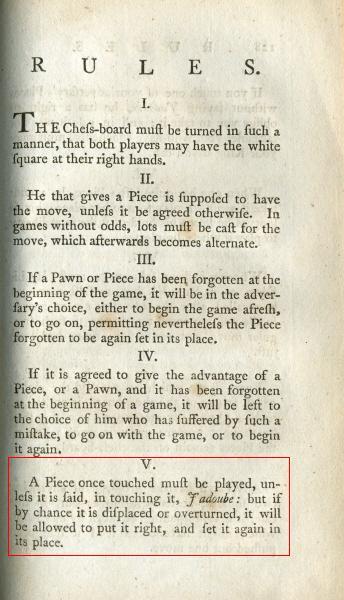
(5502)
Jurgen Stigter (Amsterdam) has found a much earlier occurrence of ‘j’adoube’ in relation to another board game. The following quote comes from page 136 of La maison des ievx academiqves (Paris, 1668), in the section on ‘Le Ieu du Tricque-Trac’:
‘En ce jeu c’est vne maxime tres-inuiolable, & qui deuoit estre aussi des premieres, que Dame touchée, Dame joüée, si l’on ne dit ce mot, i’addoube, horsmis dessous le bois; car si l’on en peut tenir dans ses mains, à plus forte raison y peut-on toucher innocemment, & sans en estre repris, & encourir ny perte ny contrainte de joüer: C’est mon auis que ie soumets à tout autre meilleur en ses raisons, ou en ses regles & pratiques.’
(5541)
Confirming that ‘compongo’ is indeed the term used by most Spanish players when they wish to adjust a piece on the board, Pablo S. Domínguez (Madrid) quotes from Article 4.2 of FIDE’s Laws of Chess as published by the Spanish Chess Federation:
‘El jugador que está en juego puede ajustar una o más piezas en sus casillas, siempre que previamente exprese su intención de hacerlo (por ejemplo, diciendo “compongo”).’
The English text reads:
‘Provided that he first expresses his intention (e.g. by saying “j’adoube” or “I adjust”), the player having the move may adjust one or more pieces on their squares.’
Mr Domínguez notes that some players prefer ‘acomodo’ to ‘compongo’. He adds that the verb componer in this sense dates back to at least the time of Ruy López, as is shown by this paragraph from page 65 of Libro de la invención liberal y arte del juego del axedrez (Alcalá, 1561):
‘La.3. ſea, Que ſepa que todo jugador es obligado à jugar dela pieça que tocare, ſi el tocar no fuere por cauſa de componella, y cócertalla: con tal que lo diga enderezco te, ò corrigo te, ò otra coſa ſemejáte: no paſſando mora en ello. Porque ſi entreuiniere tardança, ſea viſto auer querido jugar della, y auer ſe arrempentido por no le pareſcer bien: y por aqueſto juegue della.’
Translation by Mr Domínguez:
‘The 3rd [rule] being that the player is obliged to move the piece which he has touched, unless, in touching it, he intended only to adjust and arrange it. In that case he must say “I straighten you”or “I correct you”, or a similar thing, without delay. For, if he took time to say it, this might be seen as if he intended to move the piece and later regretted his decision, judging it a bad one; thus, he should move it.’
(6086)
From Harry Golombek’s column on page 26 of The Times, 2 December 1967, with regard to the touch-piece and j’adoube rule:
‘It seems hardly credible, but it was by an abuse of this custom that a player, an international grandmaster at that, was able to take a move back in the recent Interzonal Tournament at Sousse. In the ninth round, the Yugoslav player, Matulović, in sore straits against the Hungarian Bilek, played a move that would have lost out of hand. After he had played the move he said “Ich spreche j’adoube”, and while I doubt whether the French Academy would approve of this blend of German and French, the intention was quite clear. He wished as it were to make a retrospective adjustment. He took the losing move back, replaced it by another much better move, and eventually got away with a draw. His opponent, Bilek, protested three times to the arbiter, who, however, not having heard or seen the first part of this incident, ordered him to continue play. Poor Bilek, and fortunate Matulović, who very nearly qualified for the Candidates’ event as a result of this ill-earned half point. His fellow Yugoslavs, who witnessed the whole affair, are it seems much alarmed lest Matulović employs similar tactics in their next championship tournament.’
The above was quoted on pages 99-100 of the Christmas 1967 CHESS with this strangely-worded editorial remark:
‘Chess is perhaps the only game in which matches at such a high level as this do not have one referee detailed to watch every game, so that incidents like this can go unpenalized.’
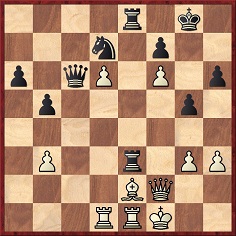
In this position from Matulović v Bilek, Sousse, 26 October 1967 White played, in quick succession, 38 Bf3, 38 Be2 and 38 Kg1.
Below, from page 8 of the January 1968 BCM, is an extract from Harry Golombek’s report on the tournament:
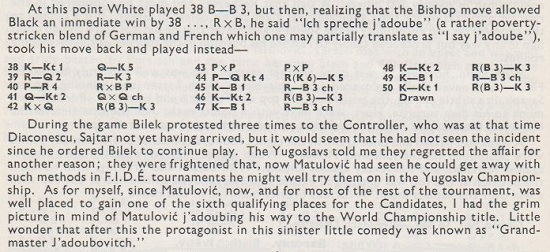
On page 64 of the March 1968 BCM a follow-up item appeared in News from Overseas section (edited by Golombek):
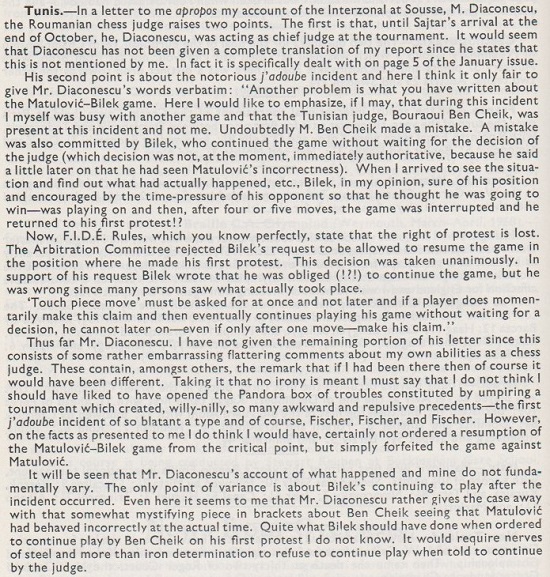
Golombek was not in Sousse at the time of the Matulović v Bilek game. He wrote on page 5 of the January 1968 BCM (concerning the tournament in general):
‘The chief arbiter was the Czechoslovak master Sajtar, and he was assisted by Diaconescu (Romania), Philippe (Austria) and two Tunisians. As a matter of fact, Sajtar, like myself, was engaged in the FIDE Congress at Venice during the earlier part of the tournament and he only arrived at the end of October, his place up to then as chief arbiter having been taken by Diaconescu. I arrived at the beginning of November and spent my first few days not only acquiring the official information as to what had taken place but finding out from the players all the action that had taken place behind the scenes as well (of which there was plenty).’
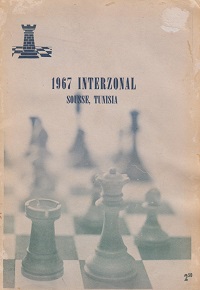
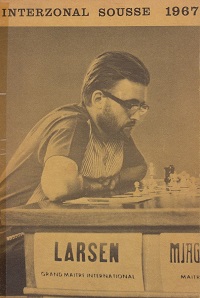
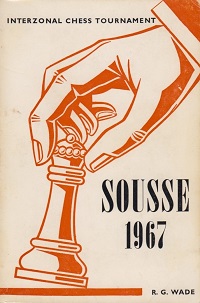
We have three books on the Sousse tournament, but only one of them provides information on the Matulović-Bilek incident. From pages 72-73 of Interzonal Chess Tournament Sousse 1967 by R.G. Wade (Nottingham, 1968):
‘Matulović-Bilek was a highly interesting game marred by an unpleasant dispute. On move 38 the Yugoslav champion Matulović is alleged to have taken back a move, then to have assured his opponent that he had said “j’adoube” and made another move. The only person present who accepted Matulović’s explanation was the Romanian judge, who semed [sic] more intent on the players passing the time control; Bilek stopped his clock three times to protest and each time the tournament judge immediately re-started it – equivalent to waving play on in football! It would be an undesirable extension of control of chess tournaments if – in time – an umpire is placed at every table, though in some events, e.g. the Capablanca Memorial Tournament, a scoring steward is placed by every table.’
In this incident even Matulović’s Yugoslav colleagues did not side with him. This is not the only example of a move being taken back during the tournament! Byrne states that a player (not a qualifier nor Matulović) took back a move in that player’s game with Byrne after completing the move, but Byrne did not protest. He would not identify the player to those curious like myself. Was the strongest move taken back?’
The full score of the Matulović v Bilek game: 1 e4 c5 2 Nf3 Nc6 3 d4 cxd4 4 Nxd4 Nf6 5 Nc3 e5 6 Ndb5 h6 7 b3 Bc5 8 Nd6+ Ke7 9 Nf5+ Kf8 10 Bc4 Bb4 11 Bd2 Qa5 12 Qf3 d5 13 exd5 Nd4 14 Nxd4 exd4 15 Nb1 Bxd2+ 16 Nxd2 Bg4 17 Qf4 Re8+ 18 Kf1 Qc3 19 Rb1 Qxc2 20 f3 Bf5 21 Qxd4 Qxa2 22 Ra1 Bd3+ 23 Bxd3 Qxd2 24 Qc5+ Kg8 25 Bc4 g6 26 Qf2 Qc3 27 Rd1 b5 28 Be2 Re3 29 g3 Kg7 30 Kg2 a6 31 d6 Rhe8 32 Rhe1 Nd7 33 f4 Qb4 34 f5 g5 35 f6+ Kg8 36 h3 Qc3 37 Kf1 Qc6 38 Kg1 Qe4 39 Rd2 Re6 40 h4 Rxf6 41 Qg2 Qxg2+ 42 Kxg2 Rfe6 43 hxg5 hxg5 44 b4 R3e4 45 Kf1 Rf6+ 46 Kg2 Rfe6 47 Kf1 Rf6+ 48 Kg2 Rfe6 49 Kf1 Rf6+ 50 Kg1 Rfe6 Drawn. Pages 78-79 of Wade’s book had the game with this note after 38 Kg1:
‘Matulović is alleged to have played first 38 B-B3, withdrawn the move, said “Ich spreche j’aboube” [sic], and played as in the text.’
Page 186 was entitled ‘Matulović-Bilek’ and quoted from the above-mentioned Golombek material in the January and March 1968 BCM. (Wade explained that ‘the following important information on this incident has appeared since the earlier comments were written’.)
Page viii of Wade’s book had this list:
‘Referees: P. Diaconescu IJ – Principal Referee 15-31 October; J. Sajtar IJ – Principal Referee 1-20 November; R. Phillip IJ; B. Ben Cheikh IJ and S. Annabi.’
Concerning ‘Phillip’, Golombek put ‘Philippe’ in the BCM (see above). Chess Personalia by Jeremy Gaige has an entry for an International Arbiter named Robert A. Philipp (1895-1970).
C.J.S. Purdy commented on the Matulović-Bilek affair on page 139 of Chess World, September-October 1967:
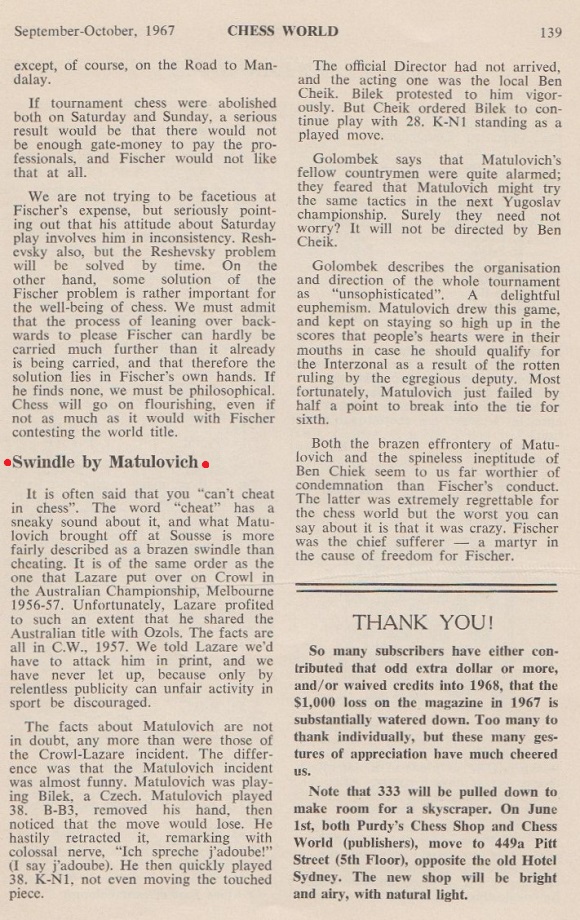
Coverage of the Sousse Interzonal in Chess Review was dominated by Fischer’s withdrawal, but in an article entitled ‘The Fischer Affair’ on pages 42-45 of the February 1968 issue, Petar Trifunovich wrote:
‘The arbiters did not shine in this tournament, as was proved by several examples. The most characteristic and worst example occurred in the game Matulović-Bilek, in which the rule of “touch-move” got a new explanation. A good part of the Fischer Affair must be charged against them because they did not act with authority and in time.’
On pages 328-329 of the November 1968 Chess Review Gligorić’s ‘Game of the Month’ column was devoted to Matulović v Fischer, Vinkovci, 1968, and after 29...Qd1 he wrote:
‘The moment is ripe for resignation. But Matulović is known for his “hobby” of adjourning, as long as is possible, to make his tournament standing look better “on paper”.’
The Review added an editorial footnote:
‘There are some other quaint tales about Milan Matulovich, such as his polygot “Ich sage j’adoube” at Sousse whereby he is now known as “J’adoubovich Matulovich”.’
The nickname was mentioned not only by Golombek on page 8 of the January 1968 BCM (see above) but also in an article entitled ‘I Was There’ by D. Bjelica on pages 49-50 of the February 1968 Chess Life. It claimed that Matulović’s response was, ‘All is fair in chess and war’.
We seek documented instances of Matulović, Bilek and the arbiters giving their respective versions of the case, e.g. in articles or interviews.
It is often affirmed that the Sousse game was not the only occasion when Matulović took back a move. From pages 123-124 of The Chess Scene by David Levy and Stewart Reuben (London, 1974):
‘Many spectators had witnessed Matulović’s move retraction but the controller was unwilling to make a decision against Matulović without having seen it himself. Bilek should have refused to play on, but the game was continued and eventually drawn. Matulović could not understand why, at its conclusion, Bilek refused to shake hands with him. Having got away with it once, Matulović pulled the same stunt against Bilek a few months later – and got away with it again!’
With respect to that last sentence, a similar claim in similar words, and similarly unsubstantiated, was written by Larry Evans in an article dated 25 August 2003 which was republished on page 288 of This Crazy World of Chess (New York, 2007):
‘A few months later, as fate would have it, Matulović got away with the same stunt against the same opponent! Thenceforth his colleagues dubbed him J’adoubovic.’
As shown above, the nickname had already been given to Matulović shortly after the episode in Sousse. Evans also mentioned the matter on page 19 of the November 1999 Chess Life, but merely quoted from a book whose title he gave as ‘The Oxford Encyclopedia Of Chess’.
David Levy referred to Matulović again in a report on the Lone Pine tournament on page 415 of the July 1975 Chess Life & Review:
‘The tournament list should also have included the well-known Yugoslav grandmaster Milan Matulović, known best for his tactics of taking back moves (e.g. against Bilek at the Sousse Interzonal in 1967), and for his selling of points.’
Levy then gave an alleged example of the latter charge.
As regards the allegation that Matulović retracted moves in other games, the following comes from a column by Golombek in The Times of 8 May 1976, page 14:
‘... Matulović, known as grandmaster Jadoubović for the skill with which he adjusted his pieces against Bilek on two notorious occasions.’
When was the second notorious occasion?
Further claims were made on pages 260-261 of Winning with Chess Psychology by Pal Benko and Burt Hochberg (New York, 1991):
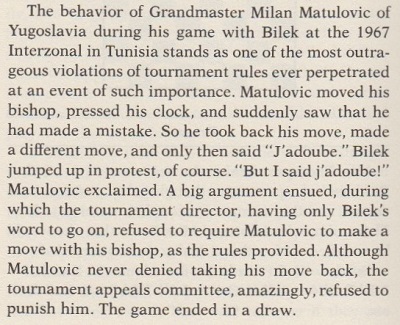
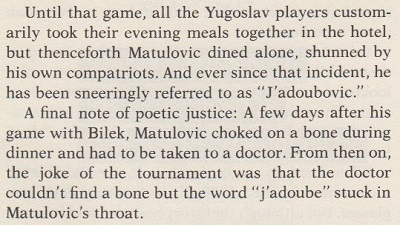
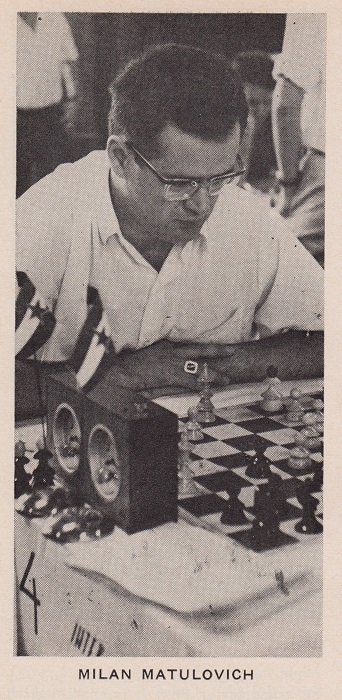
Chess Review, January 1968, page 24
Chess writers being what they are, it is difficult to find an account of the 1967 Matulović v Bilek controversy in secondary sources which does not have elementary mistakes. For instance, page 24 of The World of Chess by A. Saidy and N. Lessing (New York, 1974) stated that the game was played in 1970 and added:
‘The astounded Bilek was too stunned to protest and Matulović went on to win the game.’
The two editions of the ‘Chess Addict’ book by M. Fox and R. James (London, 1987 and 1993) – see pages 160 and 225-226 respectively – also asserted that ‘Matulović went on to win’. Page 2 of The Batsford Encyclopedia of Chess by N. Divinsky (London, 1990) stated that the game was played ‘at the Suisse interzonal’.
(9737)
The Chess-Player’s Handbook by Howard Staunton (London, 1847) was widely copied, with or without acknowledgement and often without thought.
An example, concerning J’adoube, is provided by page 36, in the section entitled ‘The Laws of the Game’:

A search in Google Books shows that Staunton’s text was reproduced verbatim in a number of publications, even though the first part of Law IX is obviously faulty.
The rule in question (from ‘Laws of Chess, as lately revised by a Committee of the London Chess Club’, published on pages 266-269 of the Chess Player’s Chronicle, 1842):

In the Handbook the fourth word, ‘take’, was subsequently corrected to ‘touch’. In which edition was the amendment first made?
(10078)
To the Chess Notes main page.
To the Archives for other feature articles.
Copyright: Edward Winter. All rights reserved.